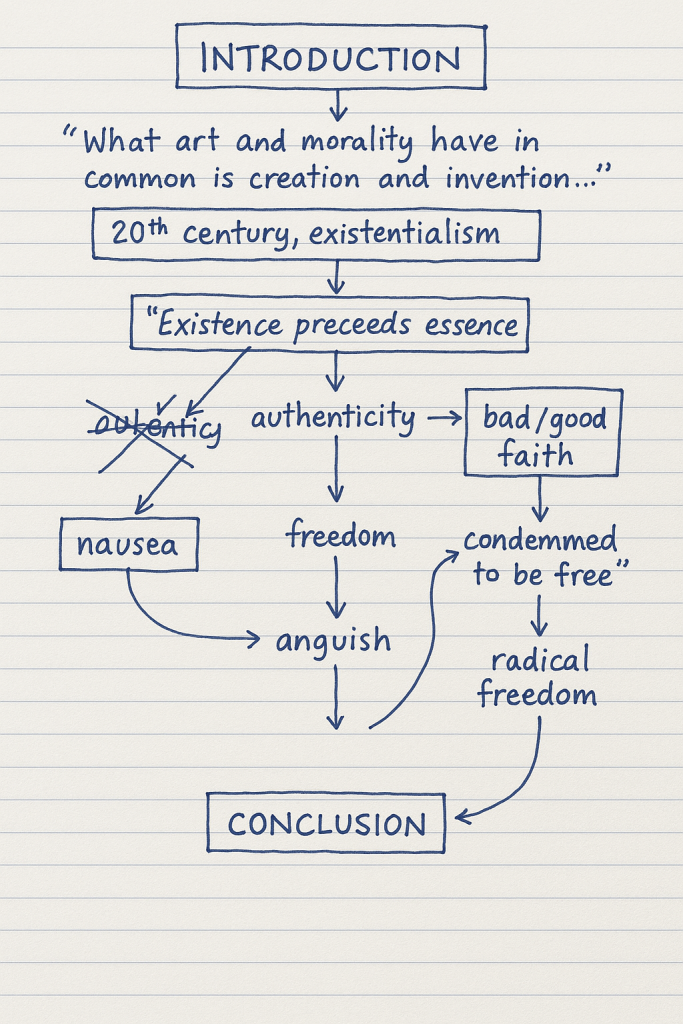From Panic to Plan: Essay Writing in Philosophy Exams
I wrote this guide to walk you through how to study smart in the run-up to the exam, and how to structure your essay when the clock is ticking.
Before the Exam: Study Smart
1. Build a Keyword List for Each Topic
When revising, don’t just passively read through notes. Actively compile a list of keywords or key ideas for each philosopher or topic — and commit them to memory. Think of these as your toolkit. In the exam, you’ll want to reach for the right tools quickly.
Here are a few examples:
- Sartre: “Existence precedes essence”, authenticity, bad/good faith, 20th century, existentialism, nausea, freedom, “condemned to be free”, responsibility, anguish, radical freedom, facticity / transcendence
- Socrates: virtue, knowledge, moral ignorance, the unexamined life, dialectic – elenchus – Socratic method, ethical inquiry, justice, wisdom, care of the soul, moral responsibility, intellectual humility, “the unexamined life is not worth living”, ethical self-knowledge, ethical universalism, moral autonomy, corruption of the youth, the Apology, moral optimism
- Kant: categorical / hypothetical imperatives, duty, good will, autonomy, moral law, Enlightenment, universalisability, ends in themselves, practical reason, maxims, moral obligation, deontology, respect for persons, moral worth, rational agents, moral freedom, Kingdom of Ends
Write these lists on index cards, colour-code them, stick them on your wall — whatever works for you. The aim is to have them at your fingertips when the exam arrives.
During the Exam: Step-by-Step
2. Pick Your Question Wisely
If there’s a choice of questions, don’t rush. Pick the one you’re most confident with, not necessarily the most exciting. Once you’ve chosen, reread the question slowly and carefully — not just once, but five, six times.
Then copy the full question word for word at the top of your essay. This isn’t just admin — it forces you to properly internalise what you’re being asked and avoid wandering off-topic.
3. Spend the First 5–10 Minutes Planning
Use this time to jot down your keywords and arrange them into a flowchart or bullet-point plan. You might have a brilliant point, but if it comes at the wrong time or in the wrong order, it’ll lose its impact.
Planning means you can:
- Reorder ideas before you start writing
- Ensure the essay flows logically
- Avoid repetition or contradictions
Don’t skip this step. It saves time in the long run.
Here’s an actual example from the 2024 MATSEC Intermediate philosophy 1st session:

Here’s an example of a possible flow chart based on the keywords that you would have memorised for this topic

Structure: Keep it Simple, Keep it Clear
Think in three parts:
Introduction
- Rephrase the question in your own words
- Say what your argument will be
- Briefly outline the structure of your essay
This sets the tone. The examiner wants to know you’ve understood the question and have a plan.
Body
- One main idea per paragraph
- Start each paragraph with a clear topic sentence
- Develop your point using keywords, concepts, and examples
- Make sure each paragraph flows into the next
Flow matters. Philosophy is about building arguments — not chucking disconnected ideas into a bucket.
Conclusion
- No surprises, punchlines, or dramatic reveals
- This is not a detective story, mystery novel, or a joke
- Just clearly restate your position, tie up the argument, and end neatly
Think of it as the moment where you leave the examiner with a final impression: clear, confident, and coherent.
Manage Your Time
Here’s a good breakdown for a 1-hour essay:
- 5–10 mins: Read the question twice and plan your essay
- 35–40 mins: Aim to spend this time writing the actual essay
- 10–15 mins: Reread and edit — this is crucial
Use the editing time to:
- Fix spelling or grammar
- Add examples
- Clarify points that feel vague
- Improve transitions between paragraphs
Top tip: When writing your answer, don’t use the full width of the paper. Leave about 20–25% of the page blank on the left and right margins. This gives you space to add or rewrite things during editing — without squashing in extra lines or sending the examiner on a wild goose chase to find a footnote three pages earlier.

Also: leave a line or two between each paragraph. This helps you stay organised and makes your work easier to read. Examiners appreciate tidy thinking and tidy handwriting.
Final Thoughts
Philosophy essays in exams are hard, no doubt about it. But they’re not mysterious. Think of them as structured, academic arguments. Show that you understand the question, know your concepts, and can think clearly under pressure.
Do that, and you’re already ahead of most. Good luck. You’ll do great.
If you’d like more help tackling philosophy essays or building confidence ahead of your exam, feel free to check out my private lessons here: Philosophy private lessons (MATSEC latest syllabus).



